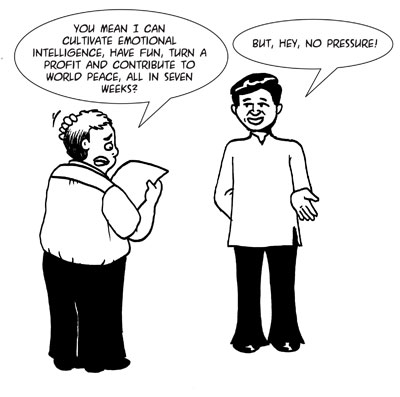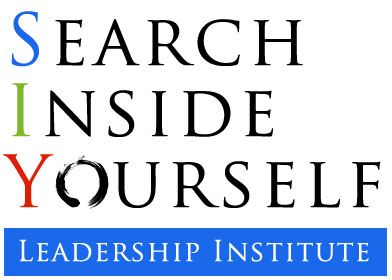Excerpts
 This book is based on the Search Inside Yourself curriculum at Google. We saw how this knowledge and the practices enhanced creativity, productivity, and happiness in those who took the course. You will find many things in this book that are very useful for you, and some things that may even surprise you. For example, you will learn how to calm your mind on demand. Your concentration and creativity will improve. You will perceive your mental and emotional processes with increasing clarity. You will discover that self-confidence is something that can arise naturally in a trained mind. You will learn to uncover your ideal future and develop the optimism and resilience necessary to thrive. You will find that you can deliberately improve empathy with practice. You will learn that social skills are highly trainable and that you can help others love you.
This book is based on the Search Inside Yourself curriculum at Google. We saw how this knowledge and the practices enhanced creativity, productivity, and happiness in those who took the course. You will find many things in this book that are very useful for you, and some things that may even surprise you. For example, you will learn how to calm your mind on demand. Your concentration and creativity will improve. You will perceive your mental and emotional processes with increasing clarity. You will discover that self-confidence is something that can arise naturally in a trained mind. You will learn to uncover your ideal future and develop the optimism and resilience necessary to thrive. You will find that you can deliberately improve empathy with practice. You will learn that social skills are highly trainable and that you can help others love you.
What I find most rewarding is how well Search Inside Yourself has worked for ordinary folks in a corporate setting right here in a modern society. If Search Inside Yourself had worked this well for people from traditionally meditative cultures doing intensive retreats in zendos or something, nobody would be too surprised. But these are ordinary Americans working in a high-stress environment with real lives and families and everything, and still, they can change their lives in just twenty hours of classroom time spread over seven weeks.
Search Inside Yourself works in three steps:
- Attention training
- Self-knowledge and self-mastery
- Creating useful mental habits
Benefits of Emotional Intelligence
There is an important question that my friends in the training business call the so-what? question, as in, “Yes, very nice, but what can emotional intelligence do for me?” In the context of the work environment, emotional intelligence enables three important skill sets: stellar work performance, outstanding leadership, and the ability to create the conditions for happiness.
Stellar Work Performance
The first thing emotional intelligence enables is stellar work performance. Studies have shown that emotional competencies are twice as important in contributing to excellence as pure intellect and expertise. A study by Martin Seligman, considered the father of modern positive psychology and the creator of the idea of learned optimism, showed that insurance agents who are optimists outsell their pessimist counterparts by 8 percent in their first year and 31 percent in their second year. (Yes, I am optimistic about writing a bestseller. Thank you for asking).
This was not surprising to me. After all, there are many jobs such as those in sales and customer ser vice in which emotional competencies obviously make a big difference. We already know that intuitively. What surprised me was the report that this is true even for individual contributors in the tech sector, namely engineers like me whom you might expect to succeed purely on intellectual prowess. According to a study, the top six competencies that distinguish star performers from average performers in the tech sector are (in this order):
- Strong achievement drive and high achievement standards
- Ability to influence
- Conceptual thinking
- Analytical ability
- Initiative in taking on challenges
- Self-confidence
Of the top six, only two (conceptual thinking and analytical ability) are purely intellectual competencies. The other four, including the top two, are emotional competencies. Being strong in emotional intelligence can help everyone become outstanding at work, even engineers.
Outstanding Leadership
Emotional intelligence makes people better leaders. Most of us understand it intuitively based on our day- to- day experience interacting with those whom we lead and those who lead us. There are also studies that back up our intuition with scientific evidence. For example, Goleman reported an analysis that shows emotional competencies to make up to 80 to 100 percent of the distinguishing competencies of outstanding leaders.
This is illustrated by the story of Gerald Grinstein, a CEO who had to go through the painful process of cutting costs. Grinstein was tough, but being a virtuoso at interpersonal skills, he earned the cooperation of his employees and managed to keep their loyalty and spirits high while turning around their once-ailing company, despite having to make very tough decisions. In fact, Grinstein performed his magic not once but twice, once as CEO of Western Airlines and again as CEO of Delta. When Grinstein took over Delta amid a crisis, he immediately went about restoring lines of communication and trust within the company. He understood the importance of creating a positive work environment and, using extraordinary leadership skills (emotional intelligence), he turned a toxic work environment into a more family-like atmosphere.
Once again, I did not find any of this surprising, because we already intuitively understand the importance of emotional intelligence in leadership. What I found surprising was this is true even in the U.S. Navy.
Another study by leadership expert Wallace Bachman showed that the most effective U.S. Navy commanders are “more positive and outgoing, more emotionally expressive and dramatic, warmer and more sociable (including smiling more), friendlier and more democratic, more cooperative, more likable and ‘fun to be with,’ more appreciative and trustful, and even gentler than those who were merely average.”
When I think of military leadership, I think of tough-as-nails people barking orders and expecting to be obeyed, so it is fascinating to me that even in a military environment, what distinguishes the best leaders from the merely average ones is emotional intelligence. The best military commanders are basically nice people who are fun to be with. Funny enough, the title of the Bachman study was “Nice Guys Finish First.”
The Ability to Create the Conditions for Happiness
Perhaps most importantly, emotional intelligence enables the skills that help us create conditions for our own sustainable happiness. Matthieu Ricard defines happiness as “a deep sense of flourishing that arises from an exceptionally healthy mind… not a mere pleasurable feeling, a fleeting emotion, or a mood, but an optimal state of being.” And that optimal state of being is “a profound emotional balance struck by a subtle understanding of how the mind functions.”
In Matthieu’s experience, happiness is a skill that can be trained. That training begins with deep insight into mind, emotion, and our experience of phenomena, which then facilitates practices that maximizes our inner well-being at a deep level, ultimately creating sustainable happiness and compassion.
My own experience is similar to Matthieu’s. When I was young, I was naturally very unhappy. If nothing good happened, then by default, I was unhappy. Right now, it is the reverse: if nothing bad happens, then by default, I am happy. I have become so naturally jolly that it even became part of my job title at Google: jolly good fellow. We all have a set point of happiness that we return to whenever the euphoria of a pleasant experience or the sting of an unpleasant experience fades out. Many of us assume this set point to be static, but my personal experience and that of many others like Matthieu suggest this set point to be movable with deliberate training.
Happily, the skills that help us cultivate emotional intelligence also help us identify and develop the inner factors that contribute to our deep sense of well-being. The same things that build emotional intelligence will also help us create conditions for our own happiness. Therefore, happiness may be an unavoidable side effect of cultivating emotional intelligence. Other side effects may include resilience, optimism, and kindness. (You may want to call your doctor to determine if happiness is right for you.)
Truth be told, of the three good things enabled by emotional intelligence, this is the one I really care about. (Hush hush, but just between you and me and the million other people reading this book, the other points about stellar work performance and outstanding leadership, while useful and true and supported by scientific evidence, are used by me mostly to get a stamp of approval from upper management.) What I really care about is happiness for my co-workers. That is why emotional intelligence excites me. It doesn’t just create the conditions for stellar success at work; it also creates the conditions for personal happiness for everyone. And I like happiness.
My Emotions Are Not Me
As we deepen our self- awareness, we eventually arrive at a very important key insight: we are not our emotions. We usually think of our emotions as being us. This is reflected in the language we use to describe them. For example, we say, “I am angry” or “I am happy” or “I am sad,” as if anger, happiness, or sadness are us, or become who we are. To our mind, our emotions become our very existence. With enough mindfulness practice, you may eventually notice a subtle but important shift— you may begin to feel that emotions are simply what you feel, not who you are. Emotions go from being existential (“I am”) to experiential (“I feel”).
With even more mindfulness practice, there may be another subtle but important shift— you may begin to see emotions simply as physiological phenomena. Emotions become what we experience in the body, so we go from “I am angry” to “I experience anger in my body.” This subtle shift is extremely important because it suggests the possibility of mastery over our emotions. If my emotions are who I am, then there is very little I can do about it. However, if emotions are simply what I experience in my body, then feeling angry becomes a lot like feeling pain in my shoulders after an extreme workout; both are just physiological experiences over which I have influence. I can soothe them. I can ignore them and go get some ice cream, knowing I will feel better in a few hours. I can experience them mindfully. Fundamentally, I can act on them because they are not my core being.
In meditative traditions, we have a beautiful metaphor for this insight. Thoughts and emotions are like clouds— some beautiful, some dark— while our core being is like the sky. Clouds are not the sky; they are phenomena in the sky that come and go. Similarly, thoughts and emotions are not who we are; they are simply phenomena in mind and body that come and go. Possessing this insight, one creates the possibility of change within oneself.
Know and Align Thyself
Alignment is built upon self- awareness. When you know yourself at a deep level, you begin to understand your core values, purposes, and priorities. You know what is really important to you and what gives you meaning. With this clarity, you know what makes you happy at work and how best to contribute to the world. You will then know what work situation you want to create for yourself. When the right opportunity presents itself, you will be able to work in ways that offer you autonomy, mastery, and purpose. With that, your work will become a source of your happiness. The cornerstone of knowing and aligning thyself is mindfulness. Even if you have no other practice than mindfulness alone, you will, over time, create the level of self-awareness you need to find alignment. Mindfulness alone is sufficient— that is the good news.










